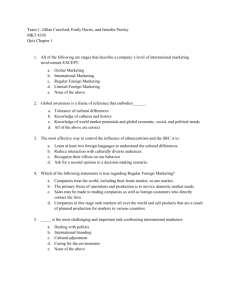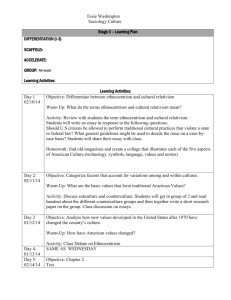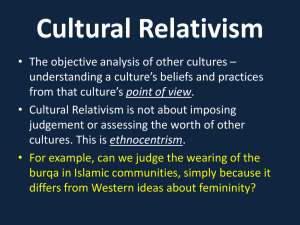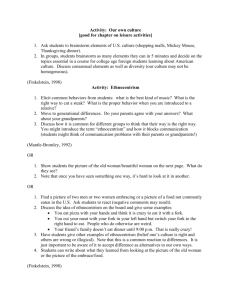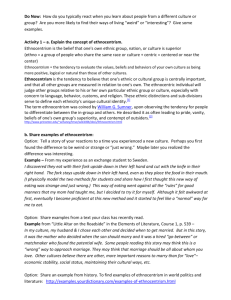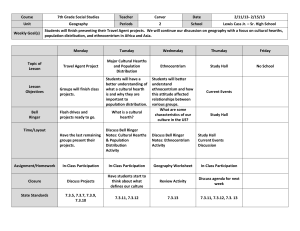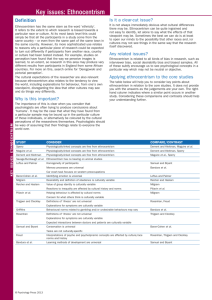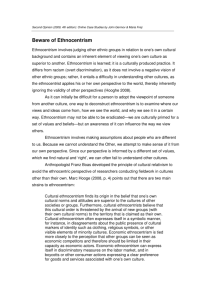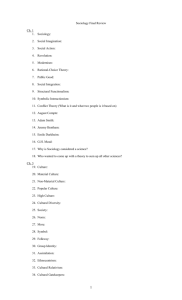Stereotypes & Ethnocentrism
advertisement
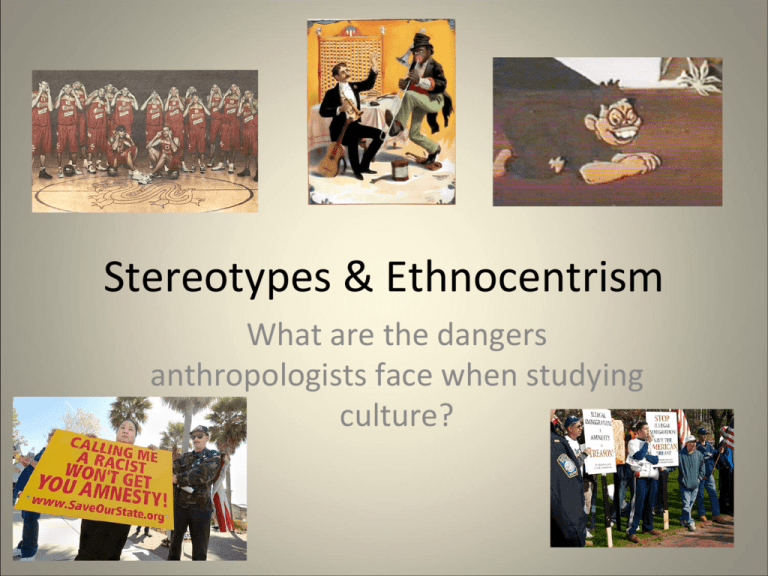
Stereotypes & Ethnocentrism What are the dangers anthropologists face when studying culture? Esera Tuaolo • Eleven (11) year NFL career (1991 – 2002) -­‐ Def. Tackle • Graduated with a 4.0 from Oregon State University (1991) • Played in the 1998 Super Bowl (w/ Atlanta Falcons) • OPENLY GAY Cat Stevens (Yusef Islam) • Singer-­‐Songwriter from the 1970’s • Famous for his soX, acousZc songs • Converted to Islam aXer a near-­‐fatal boaZng accident in 1977 • Sold all his rock star possessions and devoted his life to promoZng tolerance between Muslims and non-­‐ Muslims Jimi Hendrix • American musician / rock star of the 1960’s • In 1961, aXer being arrested for stealing cars, given the opZon of jail Zme or army service • Enlisted as a paratrooper in the 101st Airborne Division • Was a poor soldier and was dishornably discharged in 1962 What are the biggest dangers we face when studying culture? • There are two (2) major dangers when cultures interact: – Stereotypes = Over-­‐ simplified images of a person or group – Ethnocentrism = The belief or assumpZon of one group’s racial superiority over another Carolus Linnaeus -­‐ Nature Systems (1767) “As with the study of plants and animals, the human race is divided in specific varie9es…of which are inherited and learned cultural traits. For Homo European there is the inherited traits of personality governed by laws with fair skin and hair. For Homo American there is the cooper-­‐skin and personali9es governed by tribal barbaric customs and tradi9ons. Homo Asias9c [Asian] culture is a dark-­‐eyed and sooty group governed by opinions and Homo African is governed by impulses of the flesh with their darker skin and curly hair.” Who came up with the idea of ethnocentrism? • “Ethnocentrism” was the creaZon of an American professor named William Graham Sumner – (1840-­‐1910) • Worked for Yale University • Author / Anthropologist What is another big danger we face when studying culture? • Another major danger when study culture is the danger of Xenophobia – Fear of outsiders • Diagnosed as a fear of anyone from outside one’s own ethnic or cultural background Why are some people ethnocentric or xenopbic? • People will oXen pracZce ethnocentrism or xenophobia for two (2) reasons: 1. Know very liile about other groups – – Lack of educaZon Lifestyle 2. Refuse to learn about other groups – Fear Meet the NaZves: USA Welcome to Casa D’Ice North Versailles, PA The owner of this bar / restaurant is Bill Balsamico, a third-generation Italian-American QuickTi meᆰ and a T I FF (U ncompressed) decompressor are needed to see this pi cture. QuickTi meᆰ and a T I FF (U ncompressed) decompressor are needed to see this pi cture. QuickTimeᆰ and a T I FF (U ncompressed) decompressor are needed to see this picture. QuickTimeᆰ and a T I FF (U ncompressed) decompressor are needed to see this picture. What happens when cultural dangers reach their height? • When ethnocentrism reaches it height, someZmes more dramaZc events can happen: – AssimilaZon: The process by which a minority group adopts the culture of the majority • Forced • Voluntary – Ethnocide: The outright destrucZon or exterminaZon of a culture • Genocide Carlisle Indian Industrial School (1879 -­‐ 1918) NaZve American AssimilaZon American AssimilaZon? Nazi Ethnocide How can we solve the problem of ethnocentrism? • The easiest way to solve the problem of ethnocentrism is to gain experience • Learn about unfamiliar cultures • Ask quesZons about other cultures / read all you can • Be respecnul of people’s cultural / ethnic differences

